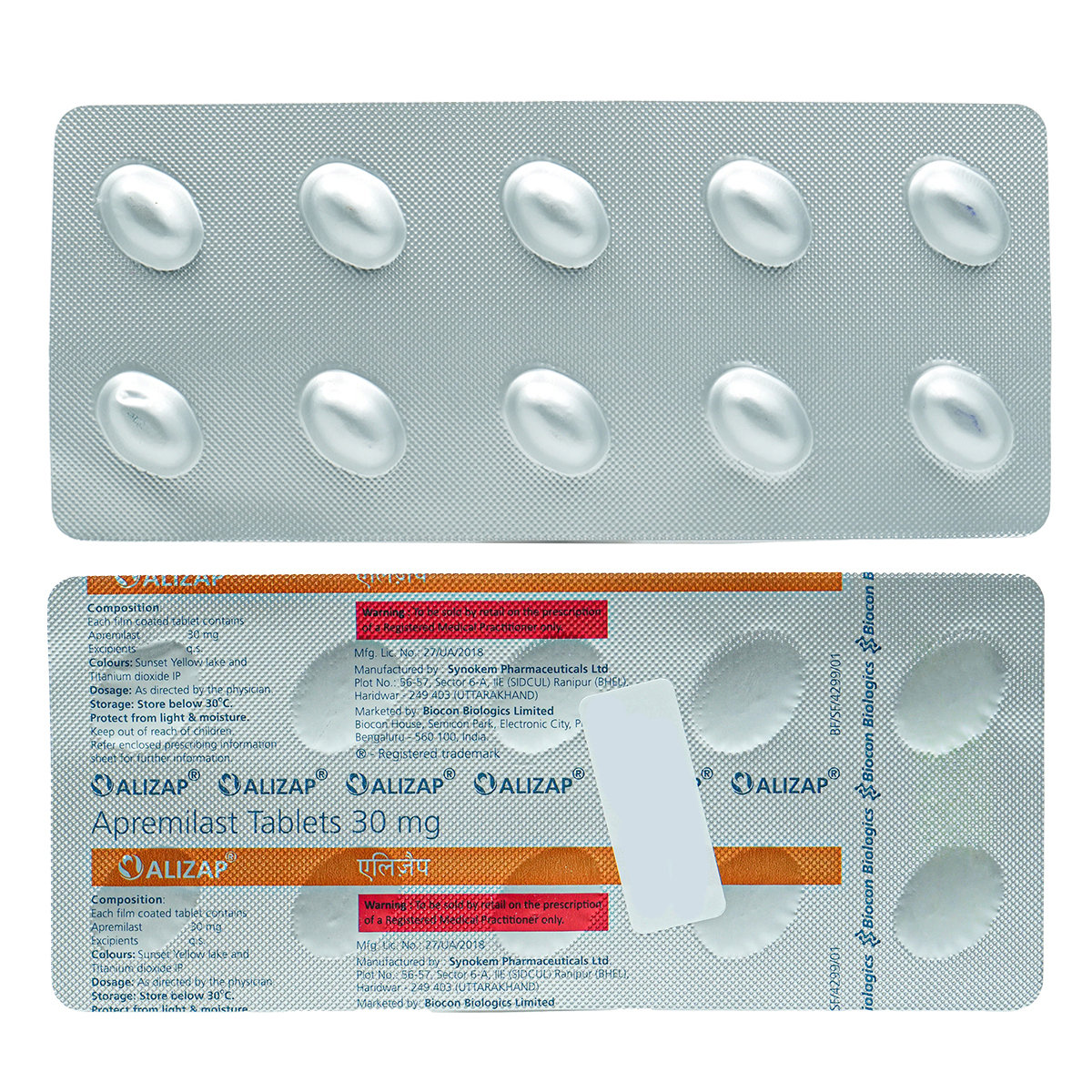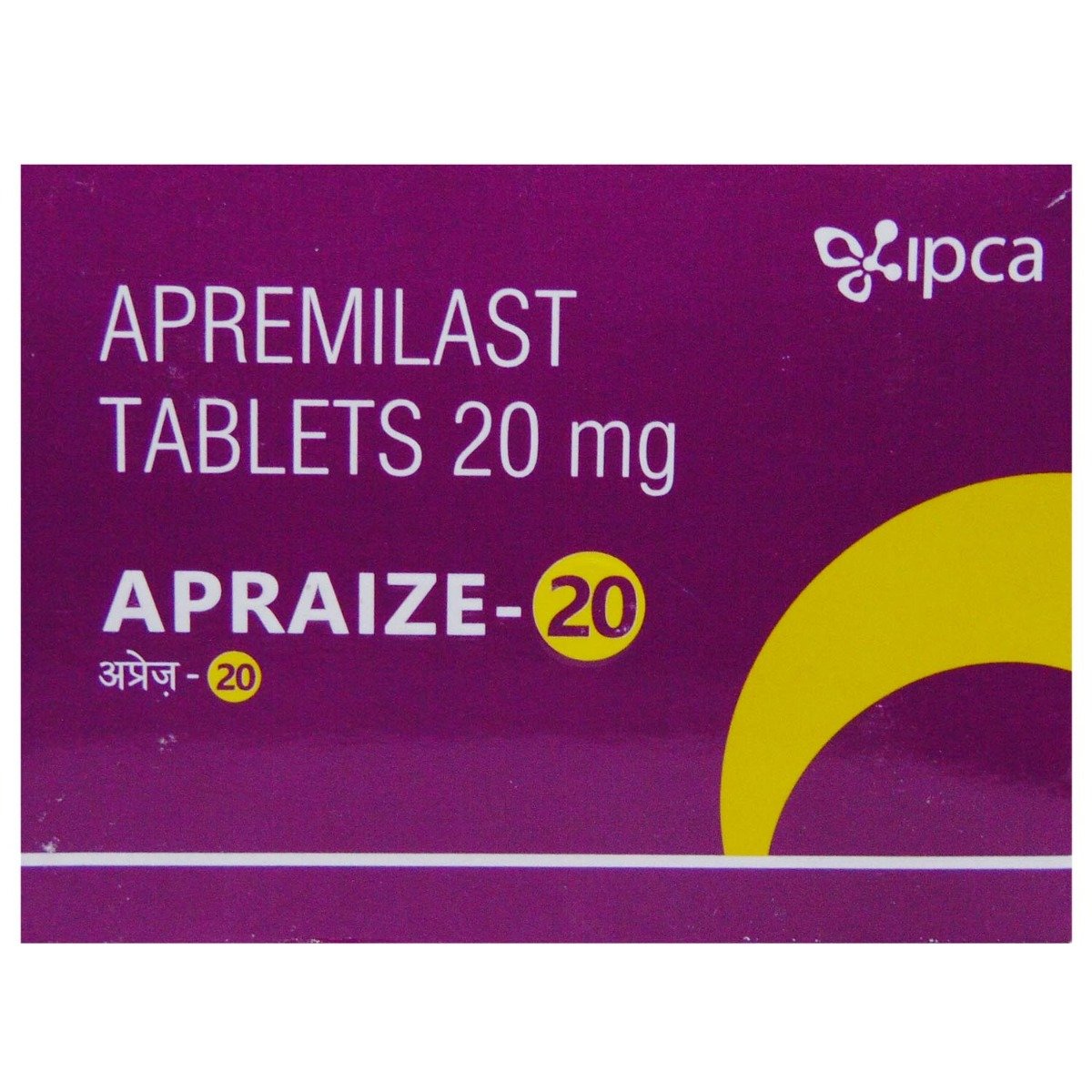Apremilast
About Apremilast
Apremilast is used to treat plaque psoriasis (scaly, itchy, and red patches on the skin), psoriasis arthritis (inflammation in the joints in people with psoriasis), and oral ulcers. Psoriasis is a chronic, painful, nontransmissible, deactivating and damaging disease.
Apremilast contains Apremilast, which works by blocking the action of some chemical messengers that are responsible for inflammation related to psoriatic arthritis and psoriasis.
You may experience certain common side effects like diarrhoea, vomiting, nausea, weight loss, and back pain. Most of these side effects do not require medical attention and gradually resolve over time. However, if the side effects are persistent, reach out to your doctor.
Before starting Apremilast, please inform your doctor if you have any allergy to Apremilast and its parts. Apremilast not recommended for use in children and adolescents aged below 17 years. If you are pregnant or breastfeeding, ask your doctor for advice before taking this Apremilast.
Uses of Apremilast
Medicinal Benefits
- Apremilast is used in treating psoriatic arthritis; it decreases pain and swelling and may help improve flexibility in the affected joints.
- It is also used to treat moderate to severe plaque psoriasis (skin disease causes red, scaly patches to form on some areas of the body) in people who may benefit from medications).
- It is used to treat ulcers in the mouth in persons with Behcet's syndrome (a disease that results from blood vessel swelling in the body).
- Apremilast works by blocking the action of some chemical messengers responsible for inflammation related to psoriatic arthritis and psoriasis, thus lowering the signs and symptoms of these conditions.
Directions for Use
- Take Apremilast with or without food as advised by your doctor.
- Follow your doctor’s recommendations on the dosage and timing of this medication to achieve optimal results.
- Swallow Apremilast as a whole with a glass of water.
- Do not crush, chew, or break it.
Storage
Side Effects of Apremilast
- Diarrhea
- Vomiting
- Nausea
- Weight loss
- Back pain
Drug Warnings
- Inform your doctor before using Apremilast, if you have previously had an allergic reaction (hypersensitivity).
- Before starting Apremilast, please inform your doctor if you have depression and suicidal thoughts.
- Inform your doctor before taking Apremilast if you have severe kidney problems.
- Inform your doctor while taking Apremilast if you lose weight without meaning to. Apremilast should not be taken in conditions like severe diarrhoea, nausea, and vomiting.
- Apremilast not recommended for use in children and adolescents aged below 17 years.
- If you are pregnant or breastfeeding, ask your doctor for advice before taking this Apremilast.
- Patients with rare hereditary galactose intolerance problems, total lactase deficiency or glucose-galactose malabsorption should not take Apremilast.
Drug Interactions
Drug-Drug Interactions: Apremilast may interact with medicines used for tuberculosis- TB (rifampicin), and medicines used in fit/epilepsy (phenytoin, phenobarbital, carbamazepine).
Drug-Food Interactions: No food interactions were found.
Drug-Disease Interactions: Apremilast should not be given to patients with depression, kidney disease, and weight loss.
Drug-Drug Interactions Checker List:
Safety Advice

Alcohol
unsafeLimit intake of alcohol, as this may increase the risk of serious side effects.

Pregnancy
cautionIf you are pregnant, inform your doctor before taking Apremilast. Consult your doctor if you become pregnant while taking Apremilast.

Breast Feeding
cautionIt is not known whether Apremilast may pass into breast milk or not. If you are breastfeeding, inform your doctor before taking Apremilast.

Driving
safe if prescribedApremilast has no or negligible influence on the ability to drive and use machines.

Liver
cautionApremilast to be taken with caution, especially if you have a history of liver problems. Your doctor may adjust the dose of this medicine based on your condition.

Kidney
cautionApremilast to be taken with caution, especially if you have a history of kidney diseases. Your doctor may adjust the dose of this medicine based on your condition.

Children
unsafeApremilast is not recommended for use in children and adolescents below 17 years.
Habit Forming
Diet & Lifestyle Advise
- Physical activity helps strengthen muscles and relieves joint stiffness. Gentle activities like 20-30minutes of walking or swimming would be helpful.
- Performing yoga may also help in improving joint flexibility and pain management.
- Maintain a healthy weight by performing regular low-strain exercises and eating healthy food.
- Get adequate sleep, as resting the muscles can help in reducing inflammation and swelling.
- Follow heat or cold therapy, and apply a cold or hot compress on the joints for 15-20minutes regularly.
- De-stress yourself by meditating, reading books, taking a warm bubble bath or listening to soothing music.
- Acupuncture, massage and physical therapy may also be helpful.
- Eat food rich in antioxidants such as berries, spinach, kidney beans, dark chocolate, etc.
- Foods containing flavonoids help in reducing inflammation. These include soy, berries, broccoli, grapes and green tea.
- Avoid smoking and alcohol consumption.
Special Advise
- Apremilast is a well-tolerated medicine. Mild stomach upset may arise early during the treatment.
- Monitor your weight repeatedly as Apremilast may lead to weight loss.
- Inform your doctor immediately if you experience new or worsened depression, suicidal thoughts, unexplained weight loss, or other mood changes.
Patients Concern
Disease/Condition Glossary
Plaque Psoriasis: It is an inflammatory disease of the skin, leading to red, scaly, thick, itchy, painful patches on your skin and can also affect your nails and scalp. It can happen at any age and is most common in 50 to 69. Internal and external activities, including sunburn, mild trauma, systemic drugs, infections, and stress, can also cause psoriasis.
Psoriatic arthritis: Psoriatic arthritis is an inflammatory disorder of the joints, which affects a few people who have skin from psoriasis.
Behçet’s disease: It is an uncommon type of inflammatory illness that affects many parts of the body. The most common difficulty is mouth ulcers. It is a disease that results in blood vessel swelling in the body.
FAQs
Apremilast is used to treat plaque psoriasis (scaly, itchy, and red patches on the skin), psoriatic arthritis (inflammation in the joints in people with psoriasis), and oral ulcers caused by Behcet's disease.
Apremilast works by blocking the action of some chemical messengers that are responsible for inflammation.
Yes, Apremilast may cause depression as a side effect. The patient may also have suicidal thoughts. Apremilast should be avoided in people with a history of depression. In case you develop any of these symptoms, Inform your doctor immediately.
Apremilast is used to treat plaque psoriasis (red, scaly, thick, itchy, painful patches on the skin) and psoriatic arthritis (a condition that causes joint pain and swelling). It is a long-period treatment and may take about 16 weeks to show an improvement.
Yes, Apremilast may cause a reduction in appetite, which may further lead to weight loss. You should monitor your weight frequently while on treatment with Apremilast. In case of big weight loss, inform your doctor. Your doctor may consider stopping Apremilast.
Rifampicin is an antibiotic. You should not take rifampicin if you are taking Apremilast. Rifampicin interferes with the working of Apremilast by reducing its levels, making it less effective. As a result, you may not see any recovery after taking Apremilast.
As soon as you recall, take the missed dose. If the next dose is approaching, skip the missing dose and resume your regular dosing regimen. Do not duplicate the dose to make up for a missing one.
No, Apremilast is not an immunosuppressant. It belongs to a class of drugs called phosphodiesterase 4 (PDE4) inhibitors which work by blocking the action of PDE4 that is found in inflammatory cells.
Take Apremilast as advised by the doctor. Swallow it as whole with a glass of water. Do not break, crush or chew it.
If you get pregnant during treatment with Apremilast, inform your doctor immediately. You are recommended to avoid pregnancy during treatment with Apremilast as it may harm unborn baby.
Apremilast may cause side effects such as nausea, vomiting, diarrhoea, back pain or weight loss. If these side effects persist or worsen, please consult your doctor.





